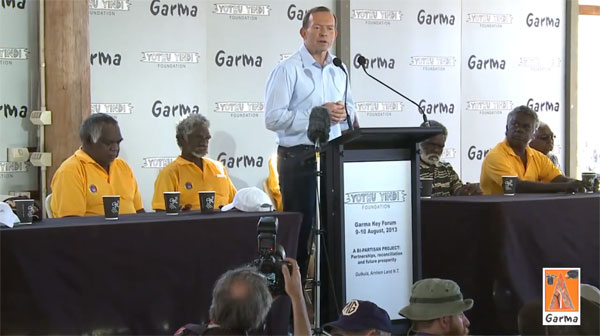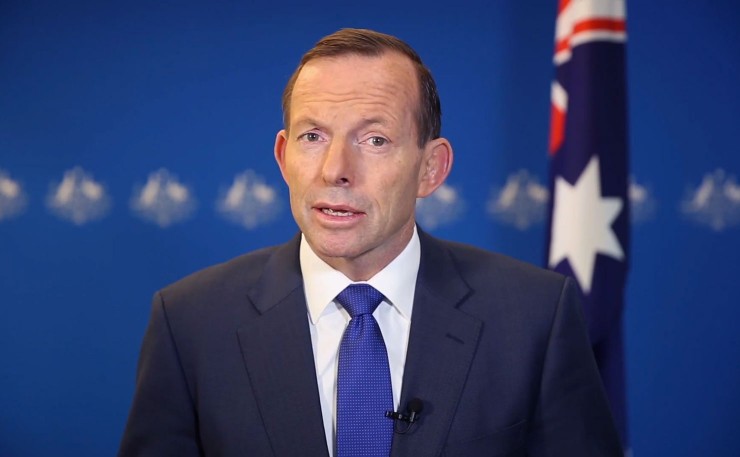The Prime Minister of Australia Tony Abbott wishes for a simpler time, when blacks knew their place. Paddy Gibson explains.
Speaking recently on the eve of his annual tour of remote Indigenous communities, Prime Minister Tony Abbott said:
“We all know back in the 60s Aboriginal people didn’t have much money, they didn’t always receive the respect they deserve but they were in the real economy and they did have pride.”
This is not the first time the Prime Minister has used appeals to nostalgia to bolster misinformation about Indigenous affairs. Most recently, Abbott has used these claims to justify his latest response to Indigenous disadvantage: the cashless debit card.
We often hear about the so-called “good old days” of meaningful Indigenous participation in the “real economy”. The problem is, such claims overlook important truths in our nation’s history.
For much of the 20th century, the wages of both women (who worked as domestic servants) and men (who worked as labourers) were controlled by state and territory governments, who held the money on trust. In a study of government data from 1918 to the 1980s, historian Rosalind Kidd made extensive findings on how government controlled wages, compensation, social security payments and pensions — even the wages of soldiers’ and returned veterans.
The rationale underpinning these practices was, of course, the patronising and damaging stereotype that Aboriginal and Torres Strait Islander Australians do not know how to handle their money.
In 2004, (then) NSW Premier Bob Carr apologised on behalf of the state of NSW for the practice of stolen wages. Aboriginal Trust Fund Reparations schemes were established in New South Wales (in 2004) and in Queensland (in 2002). Just last week, Social Justice Commissioner Mick Gooda was appointed as head of a taskforce to oversee the payment of compensation to Queensland Aboriginal workers who had their wages stolen between 1904 and the 1970s. Many Indigenous Australians have never received their wages.
Returning to Abbott’s assertion, it is both degrading and demeaning to suggest that a regime under which generations of Indigenous Australians were denied access to and control over their own savings be likened to participation in the “real economy”. The profits made by cattle barons and other beneficiaries of virtually cost-free Indigenous labour were certainly ‘real’. But the now notorious ‘trust fund’ schemes bear more resemblance to forms of slavery than to honest, paid and meaningful employment.

Like many other of Abbott’s other musing during this term as Prime Minister, such as his assertion that Australia was “unsettled” and then “nothing but bush” at the time of British colonisation, this statement about the “real economy” provides a window, not just into his ignorance of history, but to his actual philisophy when it comes to Indigenous affairs.
Abbott been a key player in re-inventing mechanisms of control over Aboriginal lives that closely mirror the welfare regimes of the 20th Century. In 2006 he stridently called for a “new paternalism”. This helped lay the groundwork for the Northern Territory Intervention in 2007, an explicitly discriminatory regime which continues today, introducing a BasicsCard to quarantine Indigenous income, a precursor to the “healthy welfare card” that is about to be rolled out in more communities.
Ironically, despite Abbott’s derision of “sit-down money”, the Liberal government in 2007 needed to abolish the Community Development Employment Projects (CDEP), an employment scheme which saw Aboriginal people working (including in Indigenous enterprises operating in a variety of fields from road maintenance to tourism), to put people on Centrelink so their income could be quarantined. Indigenous unemployment rates have grown steadily ever since.
Disgracefully, just as in the 1960s, under work for the dole schemes that have replaced CDEP, Aboriginal people are being forced to work, often in “real jobs” such as construction, child-care and education, just to receive their quarantined payments. The Gurindji people, famous for the Wave Hill walk-off, a strike against the slave-like 1960s conditions praised by Abbott, have held a series of protests against this modern day scheme of “working for rations”.
The Australian Council of Trade Unions recently raised the alarm about proposals in the Abbott Government’s Developing the North strategy to expand the scheme into private industry, “Northern Australian businesses will be able to exploit free Indigenous labour as a result of the Abbott Government’s strategy”. Under these proposals, Aboriginal people could find themselves forced to leave their communities for work on major resource projects while they remain on quarantined Centrelink payments.
Perhaps the only thing more disappointing than Abbott’s ignorance here is his failure to learn important lessons from our nation’s history: that laws and policies steeped in paternalism are bad policy and bad news for Indigenous Australia.
But hey, let’s not let history get in the way of a good story.
You can read more about the Stolen Wages scandal and the work of Dr Ros Kidd here.
Donate To New Matilda
New Matilda is a small, independent media outlet. We survive through reader contributions, and never losing a lawsuit. If you got something from this article, giving something back helps us to continue speaking truth to power. Every little bit counts.




